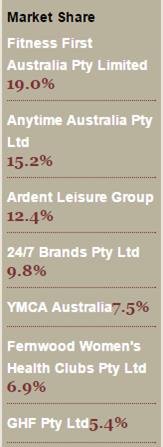Budget 24-hour gyms thriving - IBISWorld reports
EXTRA >> THE key growth segment in Australia’s gymnasium industry at the moment is the 24-hour operation – but traditional gyms are fighting back.
Overall, according to research from IBISWorld, the gym and fitness centres industry continues to grow at a rate of 3.3 percent a year and is currently worth about $1.3 billion. 
The 24 hour gyms – which do not typically provide classes to members, but offer all-hours access, lower prices and flexible membership plans – are a key growth segment as identified by IBISWorld.
The most popular establishments in the sector include Anytime Australia, Jetts Fitness and Snap Fitness. Full-service gyms are beginning to fight back against this fierce competition by reducing prices, offering more flexible contracts and providing special services.
The concept of 24-hour gyms is not new, but consumer preference for the price and convenience of these establishments has grown rapidly. Two 24-hour gym chains, Anytime Fitness and Jetts Fitness, have aggressively expanded their networks, and now have about 600 locations between them.
These types of gyms require less space than full-service gyms, as they do not offer classes, which means reduced rental costs and a greater number of suitable locations. Low wage costs, due to the facilities being unstaffed for some hours during the day, allow these gyms to reduce their prices even further.
Strong growth in the number of 24-hour gyms has come at the expense of full-service gyms, causing the revenue and market share of major player Fitness First Australia to decline over the past five years.
In response to this fierce competition, some full-service gyms have begun to engage in price wars with 24-hour gyms. Many full-service gyms now provide a range of contract options, with different durations and prices.
These gyms still depend on high volumes of customers to remain viable, as they cannot compete with 24-hour gyms in terms of rent and wage costs.
Full-service gyms are also employing other strategies to lure consumers back, like providing women-only training areas. While this strategy is not expected to affect 24-hour gyms, it may take market share away from women-only gyms like Fernwood Women’s Health Clubs and Curves.
The IBISWorld report suggested as competition between full-service and 24-hour gyms intensifies, an overall rise in the number of members will be offset by declining prices.
Looking towards 2015-2020, this is expected to lead to an annualised fall in industry revenue of 0.5 percent.
“In a highly saturated market with limited room to expand further, the continuing trend of consumers switching over to 24-hour budget gyms, or taking advantage of cheaper memberships due to the price war, will lead to a revenue contraction in the gyms and fitness centres industry,” an IBISWorld spokesman said.
Current market share: 2014

Relevant industries include: Gyms and Fitness Centres, Women’s Gyms

 How to resolve AdBlock issue?
How to resolve AdBlock issue?